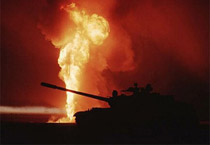Public Health
Oil Well Fires during Gulf War
VA and research organizations continue to evaluate possible causes of Gulf War Veterans' chronic multisymptom illnesses, including exposure to oil well fires.
Exposure during the Gulf War

- Between February to November 1991, Iraqi armed forces ignited oil well fires, producing dense clouds of soot, liquid, aerosols and gases
- Plumes of billowing smoke remained low to the ground, in some areas enveloping U.S. military personnel
- Exposures were highest during wintertime encampments in Saudi Arabia
Health effects of exposure to oil well fires
Particles from oil well fires may cause skin irritation, runny nose, cough, shortness of breath; eye, nose, and throat irritation; and aggravation of sinus and asthma conditions. Most of the irritation is temporary and resolves once the exposure is gone.
Research does not show evidence of long-term health problems from exposure to oil well fires at this time.
If you are concerned about your exposure, talk to your health care provider or contact your local VA Environmental Health Coordinator to help you get more information from a health care provider.
Visit the Deployment Health and Family Readiness Library to learn more about oil well fires and how they relate to your health.
VA benefits
Gulf War Veterans may be eligible for a variety of VA benefits, including:
- Gulf War Registry health exam, a free exam for possible long-term health problems associated with Gulf War service.
- Disability compensation for diseases related to military service. VA presumes certain medically unexplained illnesses are related to Gulf War service without regard to cause.
Learn more about benefits related to Gulf War service.
Research on oil well fires and health effects
VA continues to monitor Gulf War Veterans' health issues and conduct research. Past research on oil well fires and Gulf War Veterans includes:
- The Health and Medicine Division (HMD) (formally known as the Institute of Medicine) of the National Academy of Sciences, Engineering, and Medicine report Gulf War and Health: Volume 10: Update of Health Effects of Serving in the Gulf War (2016). This report did not find a definite link between Gulf War exposures and health conditions.
- HMD produced the report Gulf War and Health: Fuels, Combustion Products and Propellants (2005) which stated,"Exposure to combustion products during the Gulf War could be associated with lung cancer in some veterans." However, because scant information exists on actual exposure, the HMD committee could not draw specific conclusions about Gulf War Veterans' risk of developing lung cancer or other health problems as a result of exposure.
- The Final Report of the Presidential Advisory Committee on Gulf War Illnesses (1999) stated,"Known immediate health effects from inhaling large amounts of smoke and particulates are primarily respiratory."




















